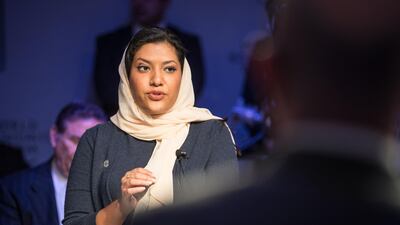Vision 2030 is an ambitious long term plan, but one that is already bringing positive change to Saudi Arabia, found a panel discussing the Kingdom’s future economy at Davos.
A year on from its implementation, the aims and progress of Saudi Arabia’s Vision 2030 programme of social and economic reforms were discussed in a wide-ranging talk. The conversation looked at topics including the impact on jobs, women and the reduction in corruption and government bureaucracy.
A roundtable discussion included Princess Reema Bint Bandar Al-Saud, Vice-President for Development and Planning at Saudi Arabian General Sports Authority, Mohammed Al-Jadaan, Saudi Arabia’s Minister of Finance, Majid Al-Kasabi, Saudi Arabia’s Minister of Commerce and Investment, Stephen Schwarzman, Chief Executive and Co-founder of Blackstone and Mohammad Al Tuwaijri, Minister of Economy and Planning of Saudi Arabia.
Mr Al-Jadaan reiterated that Vision 2030 will reform and diversify the economy to liberate the country from its dependence on government spending and instead gain income from areas such as entertainment and tourism. It also is reforming socially, legally and culturally.
He stressed that the project had brought more alignment within the government: “We have one target and we know where we are going”.
Princess Reema Bint Bandar Al-Saud said improvements around sports, culture and entertainment have a positive impact on the quality of people’s lives as well as economically.
“Those three creative industries [will] thrive, add economic impact, job creation, training, so much value that’s not just for women,” she said.
Majid Al-Kasabi explained how Saudi Arabia was creating a better “investment ecosystem”, including creating laws around bankruptcy, mortgage pledges and franchising. Moves to make doing business easier by cutting down on government bureaucracy have been made and 2018’s budget is the highest ever, with a weighty allocation set aside for the private sector.
Creating a level playing field and fighting corruption is also a key part of Vision 2030, with Mr Al-Kasabi saying: “It's true we could make mistakes here and mistakes there. Saudi Arabia is not a perfect country. Saudi Arabia is like any other country but the road to success is always under construction”. He went on to say that 70 percent of Saudis believe the country is going in the right direction, but that it was a learning process and there may be adjustments in the implementation.
As part of an anti corruption purge, a number of prominent figures in Saudi Arabia were detained in the Ritz Carlton Riyadh, a move which caused some alarm in the West.
People should “absolutely not” be worried about what could happen to them if they travel and invest in Saudi Arabia, Mr Al-Jadaan clarified. “We are creating a level playing field, encouraging investors to come and telling them it will be your quality and your price that will determine whether you are successful or not, and nothing else”.
Mohammad Al Tuwaijri acknowledged that Vision 2030 was an ambitious plan and that the Kingdom was aware the eyes of the world are on them during this process. He said that the plan was “a top down choice, but designed bottom up” to ensure it works for the people of Saudi Arabia.
_________________
Read more
Trump sets his own rules at Davos
Davos 2018: People like Trump are 'disappointing', says Malala Yousafzai
Davos 2018: UAE's Gargash calls for a discussion on extremist financing, blasts Iran
_________________
In response to a question from Sultan Al Mansouri, the UAE Minister of Economy about how the UAE and Saudi Arabia could coordinate together further to grow their economies, Mr Al-Jadaan confirmed that the Kingdom is working closely with the UAE and other Gulf states to ensure the developments were “a win for all” and that the creation of new markets would insure countries would not compete against each other.
Some of the early reforms have seen the role of women become more prominent in the Kingdom, with social and economic benefits.
Acknowledging that aside from the chair, Princess Reema Bint Bandar Al-Saud was the only woman on the stage, said: “what I represent is the change in this community that is the integration of the man and the woman, the husband, the father and the daughter. The social impact that we are actually changing is that the family is now actively engaging collectively in their lifestyle, in the way they behave and that translates to how they spend their money, how they socialise with each other and that’s what I’m here to represent, not just the woman’s voice even though I’m quite honoured to be a woman from Saudi Arabia here today”.
Some quick wins have been sought by those pushing Vision 2030, such as making women’s gyms legal. This required changes to the law, the creation of a digital infrastructure, the creation and the acceptance of new employment frameworks such as the ability to work freelance. This led to a further push for women to be able to drive in order to access these gyms.
Stephen Schwarzman remarked that the change in Saudi Arabia was “extraordinary”, saying “From operating almost everywhere in the world, you see that economic growth and other good things happen when you have intelligent, informed reform-oriented governments. As an outsider this is like a case study and it’s happening so fast and it’s so bold”.

